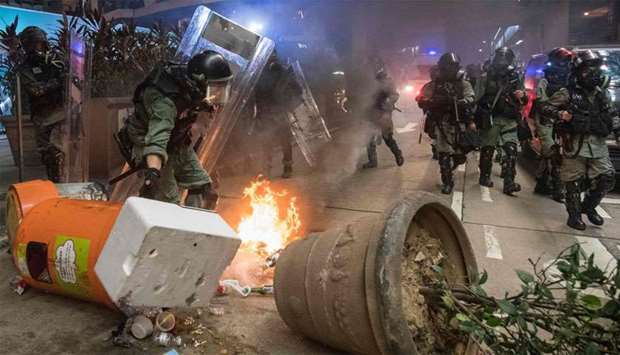An 18-year-old student was critically injured after Hong Kong police fired a live round into a group during mass anti-government protests taking place on China's National Day.
Violence had broken out in Hong Kong as protesters faced off with police on the 70th anniversary of Chinese Communist Party rule, leaving 51 people hurt, including the student and another protester critically, as of Tuesday night, said the city's hospital authority.
Police officers reportedly felt their lives were under threat as they were surrounded by protesters at a demonstration in Tseun Wan, according to a Police Senior Superintendent Yolanda Yu, prompting one officer to fire a live round into the group at close range.
Yu said it was ‘really very heartbreaking’ that the protester was hurt after he was shot in the shoulder in a video shared on Facebook.
Video footage of the incident shared on Twitter appears to show a group of protesters running after a police officer, tackling him to the ground and then hitting him with metal rods. A small group of riot police can then be seen running towards the protesters and firing tear gas and then a gun at close range before one protester can be seen falling to the ground.
British Foreign Secretary Dominic Raab called the use of live ammunition ‘disproportionate’ and warned that it could increase tension in the Chinese territory.
‘Whilst there is no excuse for violence, the use of live ammunition is disproportionate, and only risks inflaming the situation,’ he said.
Britain handed over control of Hong Kong to China in 1997 after more than 150 years of colonial rule.
An additional protester was critically injured as demonstrations continued across Hong Kong, said the city's hospital authority.
Protesters burned barricades, threw petrol bombs and set fire to subway station entrances across half a dozen districts on Tuesday night following an initially peaceful march through Hong Kong island earlier in the afternoon.
Police, stationed in large numbers across the city, responded in turn, firing tear gas and water cannons to push protesters back from major demonstration sites such as the city's government complex.
Ahead of demonstrations, police announced that they had raided 48 locations on Monday and Tuesday, seizing materials linked to petrol bombs and other explosives and arresting 51 people.
Officers were also seen stopping and searching buses for protesters on Tuesday night, since many had few alternative routes home after dozens of subway stations closed earlier in the day, although some were transported by volunteer drivers who offered to take them home.
National Day in Hong Kong, a former British colony, is an annual flashpoint for residents to express grievances against Beijing, but Tuesday's demonstrations marked some of the most intense yet as the city has seen 17 straight weeks of protest.
Protesters wore their customary black shirts on Tuesday, and many added Guy Fawkes masks to mark National Day, as a symbol against China's authoritarianism.
Signs and posters also had strong anti-Chinese themes, such as those featuring the word ‘Chinanazi,’ while images of President Xi Jinping's face were pasted on the ground across Hong Kong island for protesters to tread on during their march.
Many residents believe Beijing's leaders have meddled in Hong Kong's affairs despite promises of autonomy for the former British colony.
A leaked tape of leader Carrie Lam recently revealed that Beijing had forced her hand on a number of issues over the summer as the city spiralled into political chaos.
‘We are fighting for the freedom and democracy that we should have because the [Communist Party] has [reneged on] the promise of universal suffrage,’ said a protester named Ramon, a councillor in his 30s.
‘They also try to take away our freedom to rally, our freedom of speech, and you can see the police are really brutal after high-profile CCP [Chinese Communist Party] leaders supported them.’ Protests first began in Hong Kong on June 9 over a legislative bill that would have allowed for residents to stand trial in mainland China.
Lam made a major concession in early September by formally withdrawing the bill, but she has failed to appease political anger as many now demand an independent commission into police violence as well as electoral reform.
Since June, over 1,750 people have been arrested on charges including unlawful assembly, possession of offensive weapons, criminal damage, loitering and assaulting police officers.
‘I think the bill is only the trigger, but how they handled things made us even angrier,’ said a protester in his 40s surnamed Chan.
‘I am angry at the Beijing government because they control everything. The Hong Kong government is under their control.’ ‘We don't have the choice to choose our own chief executive and legislative council. We don't have real freedom to choose our legislative councillors because of an unjust election process,’ he said.
Taiwan, another territory with tense historical relations with Beijing, on Tuesday described the police response in Hong Kong ‘state violence.’ ‘We call on the Hong Kong government to stop repressing people and to dialog with them as soon as possible,’ said presidential spokesman Alex Huang.
The unrest also prompted the European Union to call for ‘dialogue, de-escalation and restraint,’ and urged Beijing to respect Hong Kong's autonomy.
‘More than three months since the protests began, the right of assembly and the right to demonstrate peacefully must continue to be upheld,’ said EU foreign policy spokeswoman Maja Kocijancic on Tuesday in Brussels.

